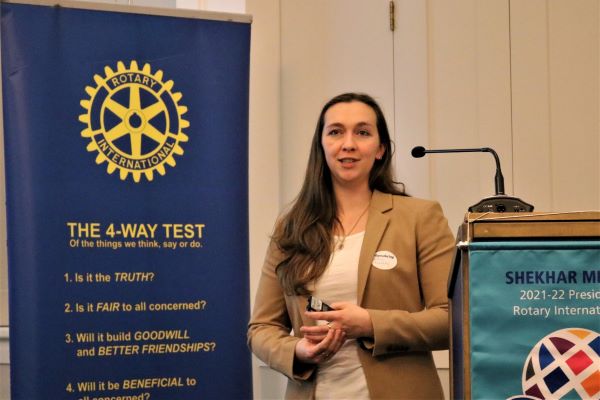
At our last dinner meeting we were fortunate to hear from the very talented Dr Helen Murray, a postdoctoral research fellow at the University of Auckland studying the anatomical changes in neurodegenerative diseases using post-mortem brain tissue. Helen made an incredibly complex subject so interesting that she was able to hold members and visitors spell bound!
Dr Murray is captain of the NZ Ice Fernz women’s ice hockey team and as such her research is closely aligned to her personal experience which is helping better understand brain changes after repeated injury from severe knocks in contact sport and how then to improve brain health in sport.
If you would like to join with us to hear other outstanding speakers, and to participate in other club activities please call or email Colin Monk Mob: 0275 771 879 email: monk@xtra.co.nz .
Dr Helen Murray is a postdoctoral research fellow who holds a Health Education Trust Post-Doctoral Fellowship. She is currently based in Professor Maurice Curtis’ lab at the Centre for Brain Research and concurrently holds a non-clinical collaborator appointment in Dr. Alan Koretsky’s lab at the National Institutes of Health in Bethesda, USA.
Her research examines anatomical changes in neurodegenerative diseases using post-mortem human brain tissue. She has recently returned to New Zealand full-time to establish a research program studying the pathology of chronic traumatic encephalopathy, a neurodegenerative condition associated with repetitive head injury in sport. As captain of the New Zealand Ice Fernz – the New Zealand women’s ice hockey team – this research is closely aligned to her experience as an athlete and her expertise in human tissue anatomical research.
Her research utilizes a novel tissue labelling technique called multiplex immunohistochemistry which achieves labelling of up to 100 proteins on a single piece of tissue. She has built a broad team of international and domestic collaborators to develop new analysis pipelines for this high-content anatomical data.
Her long-term vision is to develop the multiplex immunohistochemistry technique as a collaborative platform and the basis for her neuropathology research on chronic traumatic encephalopathy.